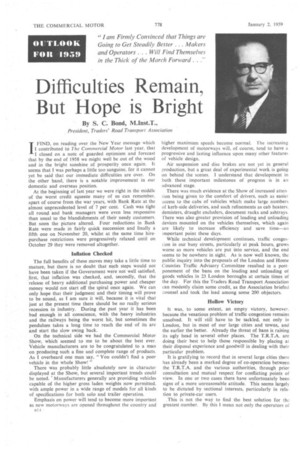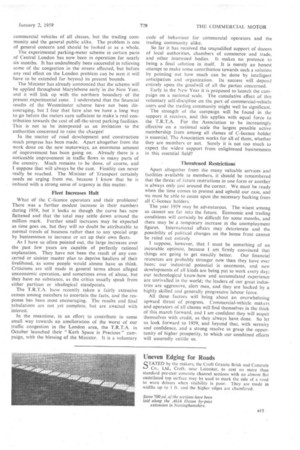Difficulties Remain, But Hope is Bright
Page 48

Page 49

If you've noticed an error in this article please click here to report it so we can fix it.
"lam Firmly Convinced that Things are Going to Get Steadily Better . . . Makers and Operators . . . Will Find Themselves in the Thick of the March Forward. .
By S. C. Bond, Minst.T.,
President, Traders' Road Transport Association IFIND, on reading over the New Year message which I contributed t6 The Commercial Motor last year, that I closed on a note of guarded optimism and forecast that by the end of 1958 we might well be out of the wood and in the bright sunshine of prosperity once again. It seems that I was perhaps a little too sanguine, for it cannot yet be said that our immediate difficulties are over. On the other hand, there is a notable improvement in our domestic and overseas position.
At the beginning of last year we were right in the middle of the worst credit squeeze many of us can remember, apart of course from the war years, with Bank Rate at the almost unprecedented level of 7 per cent. Cash was tight all round and bank managers were even less responsive than usual to the blandishments of their needy customers. But soon the picture altered. Four reductions in Bank Rate were made in fairly quick succession and finally a fifth one on November 20, whilst at the same time hirepurchase restrictions were progressively relaxed until on October 29 they were removed altogether.
Inflation Checked
The full benefits of these moves may take a little time to mature, but there is no doubt that such steps would not have been taken if the Government were not well satisfied, first, that inflation was checked, and, secondly, that the release of heavy additional purchasing power and cheaper money would not start off the spiral once again. We can only hope that their judgment and their timing will prove to be sound, as I am sure it will, because it is vital that just at the present time there should be no really serious recession in industry. During the past year it has been bad enough in all conscience, with the heavy industries and the railways being the worst hit, but sometimes the pendulum takes a long time to reach the end of its arc and start the slow swing back.
On the technical side we had the Commercial Motor Show, which seemed to me to be about the best ever. Vehicle manufacturers are to be congratulated to a man on producing such a fine and complete range of products. As I overheard one man say, "You couldn't find a poor vehicle in the whole Show!"
There was probably little absolutely new in character displayed at the Show, but several important trends could be noted.* Manufacturers generally are providing vehicles capable of the higher gross laden weights now permitted, with ample power in a wide range of models for all kinds of specifications for both solo and trailer operation.
Emphasis on power will tend to become more important as new motorways are opened throughout the country and n1,1
higher maximum speeds become normal. Hie increasing development of motorways will, of course, tend to have a progressive and lasting influence upon many other features of vehicle design.
Air suspension and disc brakes are not yet in general production, but a great deal of experimental work is going on behind the scenes. I understand that development in both these important milestones of progress is in an advanced stage.
There was much evidence at the Show of increased attention being given to the comfort of drivers, such as easier access to the cabs of vehicles which make large numbers of kerb-side deliveries, and such refinements as cab heaters. demisters, draught excluders, document racks and ashtrays. There was also greater provision of loading and unloading devices mounted on the vehicles themselves, which again are likely to increase efficiency and save time—an important point these days.
While technical development continues, traffic congestion in our busy streets, particularly at peak hours, grows worse as more vehicles are put into service, and the end seems to be nowhere in sight. As is now well known, the public inquiry into the proposals of the London and Home Counties Traffic Advisory Committee resulted in a postponement of the bans on the loading and unloading of goods vehicles in 23 London boroughs at certain times of the day. For this the Traders Road Transport Association can modestly claim some credit, as the Association briefed counsel and took the lead among some 200 objectors.
Hollow Victory It was, to some extent, an empty victory, however. because the vexatious problem of traffic congestion remains unsolved. It will still have to be tackled, not only in London, but in most of our large cities and towns, and the earlier the better. Already the threat of bans is raising its ugly head in several other places. The T.R.T.A. are doing their best to help those responsible by placing at their disposal experience and goodwill in dealing with their particular problem.
It is gratifying to record that in several large cities there has already been a marked degree of co-operation between the T.R.T.A. and the various authorities, through prior consultation and mutual respect for conflicting points of view. In one or two cases there have unfortunately been signs of a more unreasonable attitude. This seems largely to be dictated by sectional interests, particularly in relation to private-car users.
This is not the way to find the best solution for the greatest number. By this I mean not only the operators of commercial vehicles of all classes, but the trading community and the general public alike. The problem is one of general concern and should be looked at as a whole.
The experimental parking-meter scheme in certain parts of Central London has now been in operation for nearly six months. It has undoubtedly been successful in relieving some of the congestion in the streets affected, but before any real effect on the London problem can be seen it will have to be extended far beyond its present bounds.
The Minister has already announced that the scheme will be applied throughout Marylebone early in the New Year, and it will link up with the northern boundary of the present experimental zone. I understand that the financial results of the Westminster scheme have not been discouraging, but I fear that here also we have a long way to go before the meters earn sufficient to make 'a real contribution towards the cost of off-the-street parking facilities. This is not to be interpreted as an invitation to the authorities concerned to raise the charges!
In the matter of road development and construction much progress has been made. Apart altogether from the work done on the new motorways, an enormous amount of improvement has been going on. Already there is a noticeable improvement in traffic flows in many parts of the country. Much remains to be done, of course, and I suppose that will always be the case. Finality can never really be reached. The Minister of Transport certainly needs no urging from me, because I know that he is imbued with a strong sense of urgency in this matter.
Fleet Increases Halt
• What of the C-licence operators and their problems? There was a further modest increase in their numbers during 1958, but it looks as though the curve has now flattened and that the total may settle down around the million mark. Further small increases may be expected as time goes on, but they will no doubt be attributable to normal trends of business rather than to any special urge by businessmen to increase or set up their own fleets.
As I have so often pointed out, the large increases over the past few years are capable of perfectly rational explanation. They have not been the result of any concerted or sinister master plan to deprive hauliers of their livelihood, as some people would almost have us think. Criticisms are still made in general terms about alleged uneconomic operation, and sometimes even of abuse, but they have no substance, as the critics usually speak from either partisan or ideological standpoints.
The T.R.T.A. have recently taken a fairly extensive census among members to ascertain the facts, and the response has been most encouraging. The results and final tabulations are not yet complete, but are awaited with interest.
In the meantime, in an effort to contribute in some small way towards an amelioration of the worst of our traffic congestion in the London area, the T.R.T.A. in October launched their "Kerb Space is Precious" campaign, with the blessing of the Minister. It is a voluntary
code of behaviour for commercial operators and the trading community alike.
So far it has received the unqualified support of dozens of local authorities, chambers of commerce and trade, and other interested bodies, It makes no pretence to being a final solution in itself. It is merely an honest attempt to make some contribution towards such a solution by pointing out how much can be done by intelligent anticipation and organization. Its success will depend entirely upon the goodwill of all the parties concerned.
Early in the New Year it is proposed to launch the campaign on a national scale. The cumulative effect of this voluntary self-discipline on the part of commercial-vehicle users and the trading community might well be significant.
The strength of the campaign will be found in the support it receives, and this applies with equal force to the T.R.T.A. For the Association to be increasingly effective on a national scale the largest possible active membership from among all classes of C-licence holder is essential. The Association works for all of them, whether they are members or not. Surely it is not too much to expect the widest support from enlightened businessmen in this essential field?
Threatened Restrictions'
Apart altogether from the many valuable services and facilities available to members, it should be remembered that the threat of future restrictions in one form or another is always only just around the corner. We must be ready when the time comes to present and uphold our case, and we must be able to count upon the necessary backing from all C-licence holders.
The year 1959 may be adventurous. The wisest among us cannot see far into the future, EConomic and trading conditions will certainly be difficult for some months, and there may be a temporary increase in the unemployment figures. International affairs may deteriorate and the possibility of political changes on the home front cannot be ruled out entirely.
I suppose, however, that I must be something of an incurable optimist, because 1 am firmly convinced that things are going to get steadily better. Our financial resources are probably stronger now than they have ever been; our industrial potential is enormous, and new developments of all kinds are being put to work every day; our technological know-how and accumulated experience are unrivalled in the world; the leaders of our great industries are aggressive, alert men, and they are backed by a highly skilled and generally progressive labour force.
All these factors will bring about an overwhelming upward thrust of progress. Commercial-vehicle makers and operators of all classes will find themselves in the thick of this march forward, and 1 am confident they will acquit themselves with credit, as they always have done. So let us look forward to 1959, and beyond that, with serenity and confidence, and a strong resolve to grasp the opportunity of higher prosperity, to which our combined efforts will assuredly entitle us.




































































































